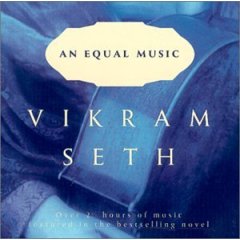

by Vikram Seth
Phoenix pb1999, London
What makes a really good story? What is really worth telling? An author should love all his characters, show them as they are in such a way that we feel that they cannot help but be what they are, not judge them or incite us to judge them as good or bad. Such an attitude could inspire us sometimes to go beyond ‘like’ and ‘dislike’.
In a romantic novel the above principle is extended in a particular way: a man reader should fall in love with the heroine and feel a deep sympathy for the hero – perhaps he would not have acted/reacted in the same way, but he can understand why he did so. (It would be comparable for a woman reader if the book were written in the third person – this book is not).
Well, did I fall for Julia? Would I recognise her immediately if I met her, if I did not know certain specific attributes (that she is a fine pianist, and so on)? Well, almost. But I gradually lost sympathy for Michael, the ‘I’ of the book. Though at the end, he seems to recognise that his past actions cannot be made good, he is too selfish, childish, full of self-pity, and ungrateful. Well, so may we be, but why is he so? Being working-class Rochdale isn’t in itself an answer.
The strength of the book is its evocation of relationships. As a non-musician I was enthralled by the descriptions of the other members of the quartet, their life as musicians, their moods and interactions, and what happens when they rehearse and play. Has Beethoven opus 104 now been re-recorded? I must find out!
Another reader adds:
I purchased the book in India. It seemed appropriate since Vikram Seth is a distinguished Indian writer in English but I was intrigued to discover that it is set largely in the part of Kensington I know so well. I appreciated the authenticity of the observation of the streets and parks in the changing seasons and how throughout the novel the settings reflect the different stages of Julia and Michael’s relationship.
She is for him the muse, the idealised love without whom he feels himself to be incomplete and some of the finest, most poetic passages in the novel evoke the almost Lear-like sense of anguish and dislocation experienced in losing her,- although it is clear to the reader that Michael’s temperament renders him incapable of offering her the support she needs in everyday life. It is in listening to her play ‘The Art of Fugue’ that he experiences another level, expressed by John Donne, in words quoted at the beginning of the book, an inner place where there is, “but one equal music, no fears nor hopes, but one equal possession, no foes nor friends, but one equal communion and identity, no ends nor beginnings, but one equal eternity”.
Tilo Ulbricht